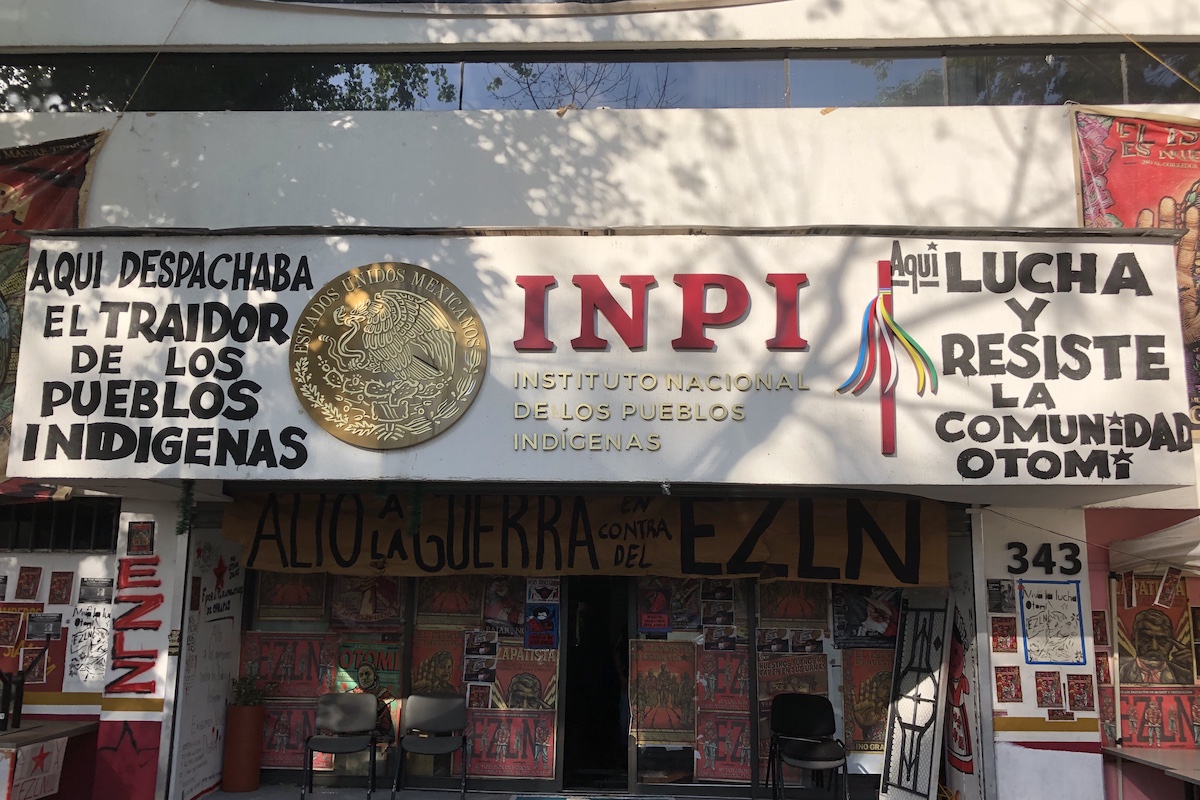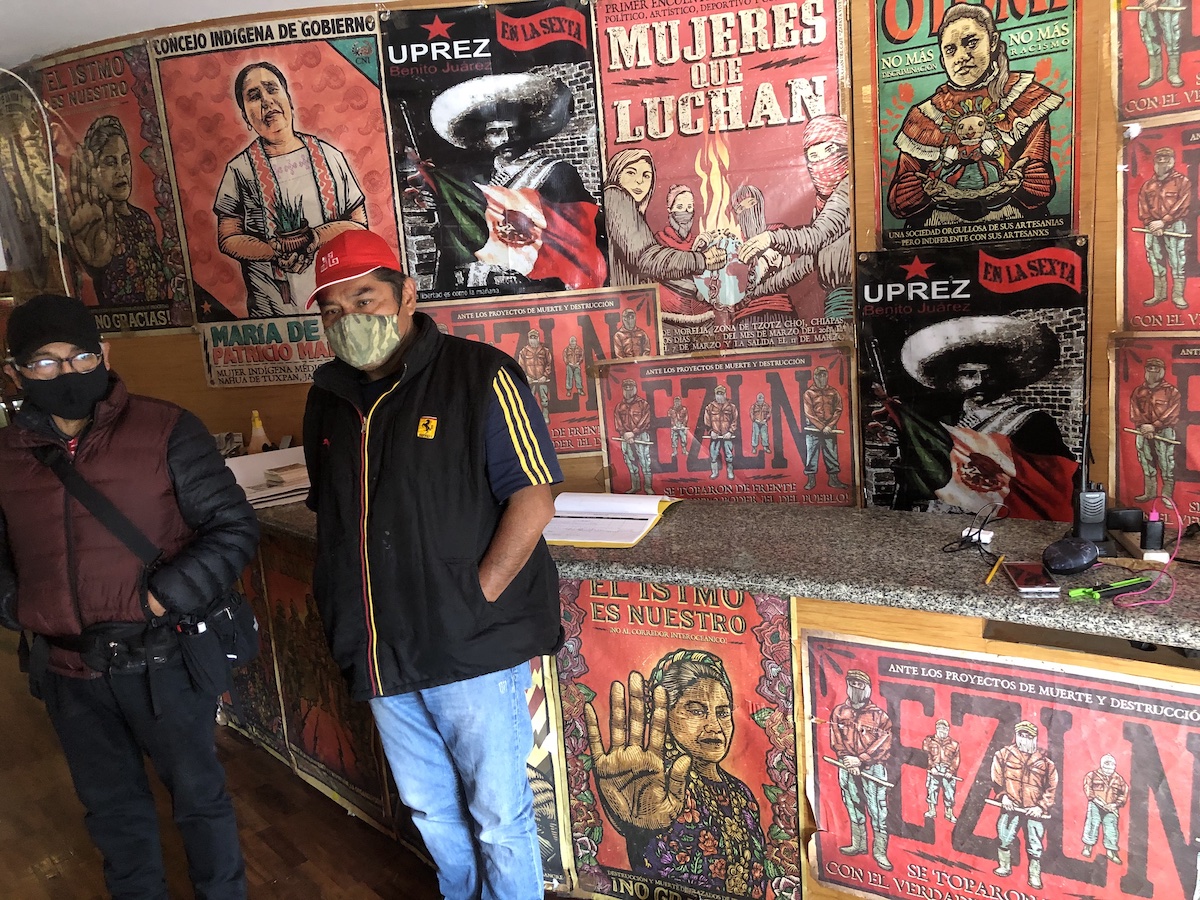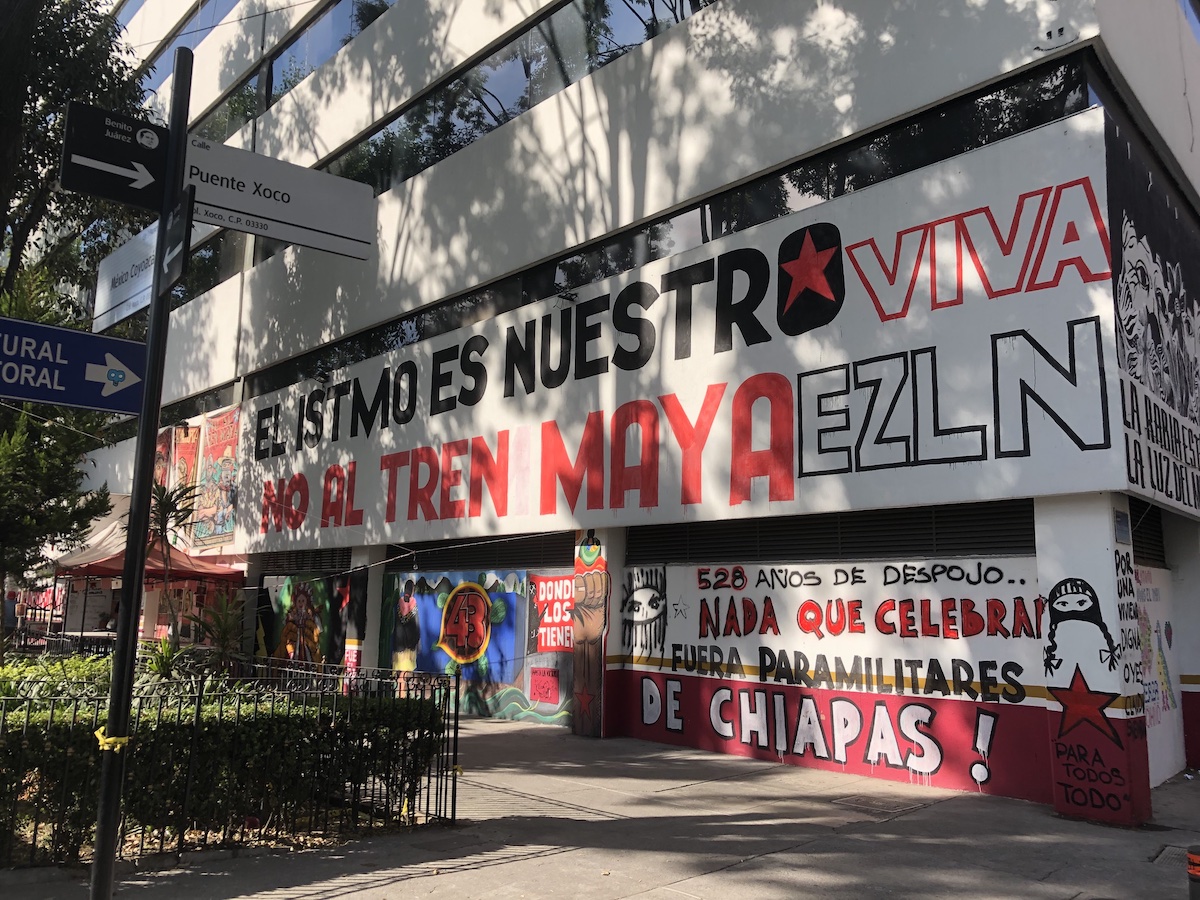

The front entrances of the occupied headquarters of the National Institute of Indigenous Peoples in Mexico City, where the Otomí strikers have placed protest graffiti and signage. (Jacob Alabab-Moser/Latino Rebels)
MEXICO CITY — For close to four months, members of the Indigenous Otomí community in Mexico City have occupied government offices amid the effects of worsening public health and economic crises that have exacerbated their decades-long neglect by local and federal authorities.
On October 12, around 150 people from the community staged the toma of the National Institute of Indigenous Peoples (INPI) with demands for better policies addressing both the Otomí in the capital and Indigenous pueblos all over Mexico.
“The Otomí community is demanding the right to decent housing, employment, education, health and food here in Mexico City,” said Diego García, a spokesman for the toma. The occupiers also demand a cancellation of President López Obrador’s megaprojects and more resources for Santiago Mezquititlán, an impoverished village in Querétaro state from which the majority of Otomí living in the capital migrated. Authorities have not met any of the demands so far.
Two weeks into the occupation, INPI —a federal agency— and the local Mexico City government agreed to hold a series of roundtables in front of the occupied offices with the goal of discussing the community’s various demands. However, the Otomí decided to pause the dialogue sessions in mid-December, when the capital re-entered its most serious coronavirus lockdown since last spring.
Even when the roundtables were functional, the only demand that saw substantive progress was that of achieving adequate housing, García said. For years, the Otomí have focused their efforts on expropriating four previously abandoned properties —located at Zacatecas 74, Guanajuato 200, Roma 18 and Calzada Ignacio Zaragoza 1434— where families have settled in makeshift structures. If they can achieve expropriation, the families could live in social housing constructed by Mexico City’s Housing Institute (Instituto de Vivienda) on those properties and pay off their mortgages through loans.
At a November 25 roundtable, Mexico City’s Interior Secretary (Secretario de Gobierno) José Alfonso Suárez del Real said that expropriations would take place soon: Guanajuato and Zarzagoza in the first quarter of this year and Roma 18 in August 2021. Zacatecas 74 should have already been expropriated by now, as, without any apparent owners who might require compensation, it poses the easiest process, said Jrosario Pedro Francisco, a leader at the property who has driven the expropriation effort. After the expropriation, Vivienda can move forward with demolition on the property and the construction of housing.


Inside the former waiting room of the INPI headquarters, Otomí demonstrators have erected a security check and coffee station adorned with posters illustrating the struggle of indigenous pueblos across Mexico. Toma spokesman Diego García and security guard Telésforo Francisco are shown. (Jacob Alabab-Moser/Latino Rebels)
The first declaration of the expropriation decree for Zacatecas was published on December 15 in the Gaceta Oficial de Ciudad de México, the city government’s official publication for laws and decrees, but a signature from the mayor, Claudia Sheinbaum, and a final publication of the decree are needed to complete the process.
“Having [the signature] is to have our property guaranteed for us,” Pedro Francisco said. Without it, “nothing is guaranteed.” He claimed that he and other residents have provided all necessary documentation so they remain puzzled about why Sheinbaum has delayed the process. While the closure of some government offices during the current lockdown in Mexico City could provide a possible reason, he mentioned that the mayor stopped the expropriation process at the same stage in 2019. The excuse then was the need to reallocate funds for the reconstruction of damaged buildings following the 2017 earthquake.
Similar disappointments arose with processes during previous administrations.
“Whenever the government changes, the papers are stopped, they expire, and we have to go back and renew each of them,” said Antonia Pedro Blas, Pedro Francisco’s daughter, who also lives at Zacatecas with her three children.


On the walls of the INPI offices, Otomí residents participating in the toma have painted slogans and imagery to articulate their demands for change from the government. Here, phrases opposing the current administration’s plans for the development of megaprojects. (Jacob Alabab-Moser/Latino Rebels)
While Zacatecas residents wait for Sheinbaum, living conditions continue to deteriorate amid the pandemic and its restrictions. Many residents depend on the sale of artisan handicrafts to survive, but “there aren’t people out there to buy from us,” said Paula, a mother of five. Since the beginning of the pandemic, the community has had to rely on economic aid from the city government and donations from passerby, sometimes in exchange for their signature “Ar Lele” dolls. Moreover, Pedro Blas said that socially distancing is “impossible” for her family in the encampment, which makes sense given that the 140 people who live there share three toilets and showers. Rents are too expensive to find other housing in the gentrifying Roma Norte neighborhood that surrounds the encampment.
In response to the government’s inaction and apathy, the occupiers of the INPI have begun to burn official documents and furniture from the INPI offices. “We’re not leaving until this community receives the keys to their new apartments, even if it takes us two, three, five, or 20 years. It doesn’t matter,” said García, the toma spokesman.
“We are resolved to stay here because it’s better to live inside here than live in the street.” At least in the offices, there’s running water, drainage and other basic amenities, he said.
***
Jacob Alabab-Moser is a Mexico City-based freelance journalist. Twitter: @JAlababMoser.


